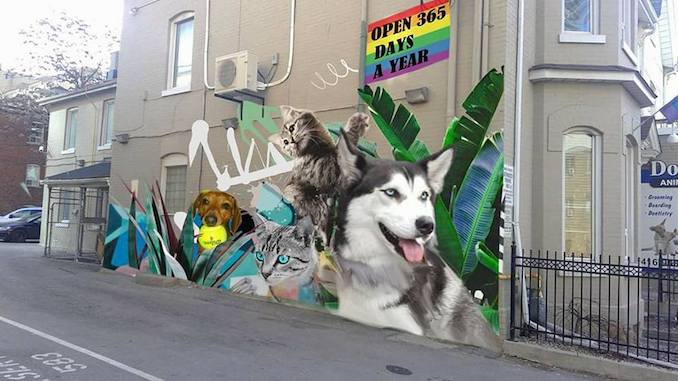Toronto’s Downtown Animal Hospital recently became Canada’s first Fear Free Certified Practice – an entire veterinary hospital and staff dedicated to assessing, preventing and alleviating fear, anxiety and stress in the pets they see and treat everyday.
According to recent veterinary studies, 51% of pets are stressed going to the vet. But it’s not just the pets who are stressed out! It turns out that 38% of owners are just stressed thinking about taking their pets to the vets even for a routine check up.
This hospital’s approach is full circle — from at-home prep to the waiting area, exam room etiquette to overnight stays. They are 100% dedicated and focused on preventing and alleviating fear, anxiety and stress in pets.

Like us, our pets need to feel comfortable not just for quick fixes but for the long-term. We had a chance to ask Dr. Heather Steede, a veterinarian at the hospital, a bit more about stress and our pets.
What are some common signs of stress that we should be watching out for in our pets?
Animals can show many different signs of stress, so it’s important for owners to be vigilant about noticing any changes in their pet. Some signs can be very subtle while others are more obvious. Obvious signs are things such as panting, pacing, refusing food, trembling and hiding. More subtle signs can include things like yawning, dilated pupils, sweaty paws and often very minor changes in body language such as tail position, ear position and avoiding eye contact.
Are signs of fear and stress different?
Not really, as fear leads to stress. Fear is an emotional response when an animal perceives something or someone as dangerous. Think of the classic fight or flight response. This fear results in mental or emotional strain or tension known as stress.
Do our pets sense our fears, stress and anxiety? And at what age would they start recognizing our feelings?
Animals are very intuitive. Animals will absolutely experience stress when owners feel stress and they can exhibit this stress in different ways. I don’t know if there are any studies that prove at a certain age they recognize our feelings, but puppies learn quickly and most respond to our body language and cues very early on.
Have you heard of pet owners using CBD Oil on their pets to calm them down? What should we know about that?
Currently there are no approved veterinary drugs containing cannabis or CBD. If a cannabis product does not have a drug identification number (DIN) or a notification number (VHP) then its safety and efficacy cannot be verified. So at present I cannot advise on CBD oil for pets.

What are some ways we can prepare our pets in stressful situations, like fireworks or Halloween night?
For situations like this, early attention to behaviour modification is important. For example, desensitization training for noises (i.e. getting them used to the noise gradually) or positive reinforcement exercises if you are trying to encourage a particular behaviour, such as going to the door and sitting without barking.
These all take time, so there is nothing wrong with removing your pet to a more relaxing area of the house for these kind of periodic disruptions. Here at Downtown Animal Hospital, we sometimes recommend pheromone products or tools like ThunderShirts for situational support. And in some special cases, the fear, anxiety and stress associated with events such as fire alarms, Halloween or fireworks is already at such a high level that short acting anti-anxiolytic medications are used.
What are some tips on how to prepare our pets for visits to your hospital?
Seeing a pet that is not fearful when it gets here certainly makes my day and that of my team, so we appreciate this question. As part of our Fear Free Practice protocol, we always start by sending out full pre-appointment documents to clients on how to make their trip to the vet easier. This approach is different between dogs and cats.
For instance, getting the cat carrier out a few days prior to the visit to allow them time to get comfortable with it is helpful. Placing a blanket in the carrier is calming for cats and even spraying this blanket with an artificial pheromone, called Feliway, can help keep cats relaxed.
With dogs it is great to have them come into the clinic for ‘Happy Visits’ on a regular basis if you live close by. If you are on a walk, come in for treats, practice having them stand on the scale and have a positive experience with the front office staff prior to an actual appointment. Dogs are often food motivated so bringing them hungry is helpful. We can create a positive experience by giving them high reward treats throughout their visit and examination.
In extreme cases, we can suggest pharmaceuticals or nutraceuticals that can make the trip safer for everyone.
There are animal hospitals like yours that takes a “Fear Free” approach to pet care. What does that mean and what makes you different from others?
As Canada’s first Fear Free Certified Practice, Downtown Animal Hospital is unique in that it is 100% committed to addressing the whole pet and it’s environment, not just the medical condition that usually precipitates the visit. Each of our staff members has their Fear Free certification and we are committed to continuing our knowledge, learning and implementation of methods that will reduce fear, anxiety and stress in our pets.
Toronto’s Downtown Animal Hospital is located at 579 Church Street. Find out more at downtownanimalhospital.com




